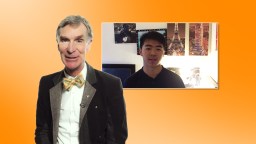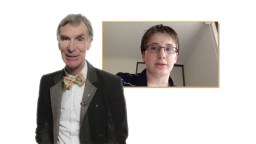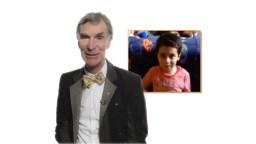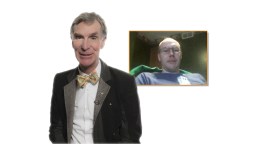On this week’s Tuesdays With Bill, Lillian has the whole summer ahead of her, and wants to know what kind of science-related activities she can do outside of the classroom.
Lillian: Hi Bill, I'm Lillian. Here's my question. I'm wondering what can I do with science outside of science class? Science is such a fun thing; I just want to know what more I can do with it. Thanks.
Bill Nye: Lillian, oh my goodness. Science is the most fun you can have. You're right, what can you do out of class? Well, you can fly model planes. You can get a magnifying glass and look at everything. Lillian, take a magnifying glass up to a tree leaf. It's amazing. It's amazing all the detail; all the stuff that goes on in a leaf that most of us never even notice or a blade of grass. Then the other thing I used to do for hours was watch ants. I don't know where you live but man I used to watch ants all day. They're absolutely fascinating. We don’t know what they're doing; they're in a hurry; they brush antenna; and they keep going. They've got stuff going on man. They're doing ant things. And the study of ants, by the way, has given humankind tremendous insight into humankind. This is to say the genes that we all share, that we're all so much alike, affects the way we behave toward each other and this behavior is very, in many ways, similar to the way ants behave. It's crazy. It's fascinating. What else? Let’s see. Get a balloon and see if you can make it fly. See if you can get it hot enough to fly. Get a hair dryer and plastic bag and something to hold the bottom open and see if you can make it fly. That's something you do outside, in the summer especially. Then catch rainwater and then look at the rainwater with your magnifying glass. It's amazing. It's amazing the stuff that goes on we just don't even notice. See if you can, Lillian — I'm looking at you in the camera — see if you can watch the color of your skin change over the summer. Even if you're constantly putting on sunscreen, if you're, like your parents are relentless spraying you down with sunscreen, see if the color of your skin, like the back of your hands is a good example, see if it doesn't change over the course of the summer and then watch it change back at the end of the summer.
Observe the moon. Take some time and watch the moon. It's amazing. It's amazing. People don't realize why the moon changes shape as seen from the Earth. And most people do not know the phase of the moon; they don't know the shape of the moon right now, but maybe you will. And of course there was a time when everybody knew the shape of the moon because we didn't have streetlights; we didn't have lights at night and so everybody was aware of how much light there would be. My grandparents would tell you exactly when the moon was going to be what shape; my parents maybe not so much; people I went to school with no way because there's more and more light. We talked about planetary science; we talked about life science; I think we talked about physical science with flying a balloon. Then chemistry — you should do some chemistry. Oh yeah, well, mix vinegar and baking soda. Put Mentos in a soft drink, but to do it outside because stuff goes everywhere. It's fun. That will be big fun Lillian. Have fun with science outside all summer. Watch the moon.






